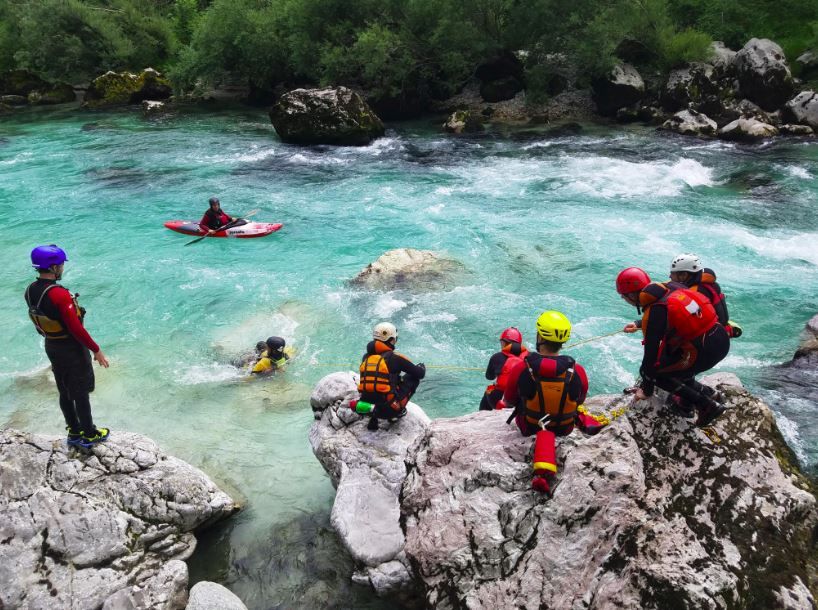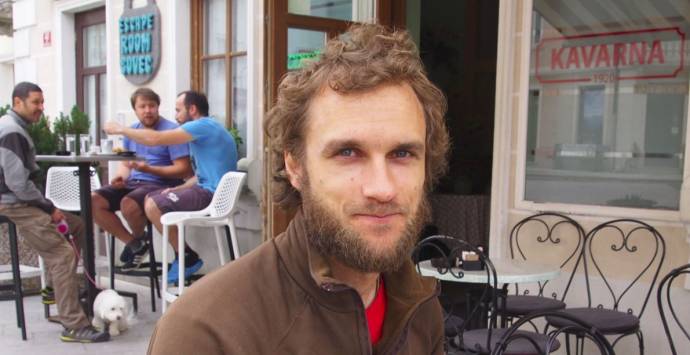August 20, 2018
A few months ago you became certified with Rescue 3 Europe, what does that mean?
Yes, I became a certified white water rescue technician instructor, and basically it means I can rescue people if they get in trouble on class 4, class 5 rapids, but also that I can teach people how to do this, as part of the Rescue 3 system.
Rescue 3 Europe was established in 2009, as branch of Rescue 3 International, which was started in 1979, in California. There are now training providers in 20 different countries in Europe, with 94 in the UK, although I’m the first qualified provider in Slovenia. The first rescue class was in April this year, and I was leading it, teaching it, but that was also my assessment. The general manager of Rescue 3 Europe, a guy called Jon Gorman, flew in from Manchester [UK] just to assess me, so he could see if I met their standards as an instructor, which I did.
When Jon was here we basically established a training centre in Bovec, under the name the Slovenian Canyoning Federation (Kanjoning Zveza Slovenije), which was actually started a few years ago, primarily to educate canyoning guides. It’s a small group of people, including Katja Rogelj and Matej Sottner, they do the canyoning courses and I do the river rescue.

Miha's 2nd rescue course in June, with the Canyoning Rescue Team from Salzburg. Photo: Miha Mihelič
How did you get into rescues?
I’m a semi-retired raft guide. I did it around the world, and every few years I would get certified to another level. I’m the first, and only, Rescue 3 instructor in Slovenia. There’s another river rescue course that’s run by the Slovenian Kayak Union, and they provide certification for whitewater rescuers for Slovenia only, not internationally, and if you make a career on the river then you really need to work in other countries, too.
Rescue 3 can help here, because it’s recognised almost worldwide, although oddly not in Slovenia. Still, it’s such a strong qualification that people will fly in from other parts of Europe, or elsewhere, to take the course. So that’s the business model we’re working on now, providing certification so that people can work around the world, and I teach to the level of white water rescue technician.
What does the 3 mean in Rescue 3?
It refers to the areas of operation: air, water and ground. Water is what I do, while air is some helicopters and also vertical rope rescue, and ground would be things like confined spaces in urban areas, and so on.
Water rescue has two segregated parts, one for firefighters and the other for river guides. It’s easy for a river instructor to teach firemen, but not vice versa, because people who’ve only done urban rescue and floods are not river people, so they’re no familiar with rapids. Here we have class 3, class 4, even up to class 5, and the fire service doesn’t go above two. The tools we use are also a little different. River guides need to carry everything with them, but the fire service can come with a big truck and keep pulling things out – all kinds of ropes, fancy, shiny equipment and so on.

Miha's 2nd rescue course in June, with the Canyoning Rescue Team from Salzburg. Photo: Miha Mihelič
Do you get scared?
Not scared, as such, but you have to have a lot of respect for the river, for the force of water, which is infinite compared to the force of a person, but getting to this point takes years of experience. You have to know how to read the water, based on the river’s features and weather conditions. You read that and then make your plan, decide where to enter, and how make your move. If you don’t have that experience, that respect, then even very easy, class 2 rapids can hurt you, maybe even worse.
How often do things get bad?
I’d say 99% of rescues are routine. It can look bad, and for the person who’s being rescued it can be very scary, with a lot of drama, but for an experienced guide it’s no problem. Of course, there are still accidents, often with private kayakers who were going alone and didn’t take the time to progress slowly, but instead jumped up too fast. Still, and I forget the statistics, a huge percentage of accidents on the river are alcohol related, and those can be easily avoided.
The infrastructure here seems really good in Bovec, how does it compare to some of the other places you’ve worked?
There are over 60 rafting companies, which is so much more than any other place I know. People can do that it because they work with tour operators, based in Ljubljana and elsewhere, or a hostel, hotel. An operator puts together a package of activities and then finds a company here to fulfil the rafting part. If you can find work with one of those and get two or three groups a week then you’re in business.
Bovec is also great very good for equipment. Sure, some of the stores are small, like the mountaineering one, but if they don’t have it they can get it in two days. For river equipment there are three stores, and all of them are good. I’ve never been in such a place, to be honest, with such a concentration of stores. If you need a kayak, you can get anything you want, all the brands, even from America.
Have there been a lot of changes in recent years?
There’s been some demographic change, sure. People come here and fall in love with the place, or with a person, and they stay. But a lot of the locals have also started to realise that they can make some income by dealing to this market. People used to have a small farm, a property, something like that, and now they convert it into apartments and rent it out during the season.
How long is the season?
Just the summer, a few months only. And in fact I’d recommend you don’t come here then. It’s like the coast – when people take a vacation everyone takes a vacation.
What do river guides do when there’s no work here?
The river scene is very international, based on word-of-mouth, Facebook pages and forums. So people work here for a while, then they go to Colorado, Canada, Japan, wherever. In the winter, for example, people go to the Southern Hemisphere, so I’ve worked in Chile and Tasmania. Sometimes I’ve even missed the Bovec season to go somewhere else – like Norway or the States.
But I’ve become a little travel weary, to be honest. Always living with 10 other people, getting a corner in a shared room. I wanted to have a garden, grow things, do something for myself, so that’s why I came back here. I’ve worked with 60-year old guys, river bums, and thought “do I want to end up like that?”. Those guys have been doing it for decades, usually travelling to the same place each season. Returning guides, after 10 years, they get raises, better positions, so it’s not bad, but not for me.
What do you do for work when you’re not on the river?
My wife and I also have a small apartment rental business, Apartments Kanin. We’ve been renovating some of those, but it’s very difficult to get contractors. Part of that is being in Bovec, of course, and the distance people need to travel, but the other is the amount of construction going on in Slovenia right now. They put you on a waiting list and then maybe, one month from now, two, they can come and take a look at the place, see what’s needed.
Is your wife from Bovec?
No, California, and she just moved here a year ago. We met in Colorado, where we were both rafting guides. The biggest problem for her now is the language, of course, because almost everyone speaks English in Bovec. And, in my opinion, the Slovenian language – as it is in books – barely exists, it’s all dialects. But we brought her dog over, Gunner, and that makes it feel more like home. Plus when the season is over we can maybe go back to California. She comes from a wine region, it’s nice.
If you’d like to learn more about Miha, and maybe book his services as an instructor or guide, or stay in one of his apartments, then you can contact him at This email address is being protected from spambots. You need JavaScript enabled to view it. or call 040331195



